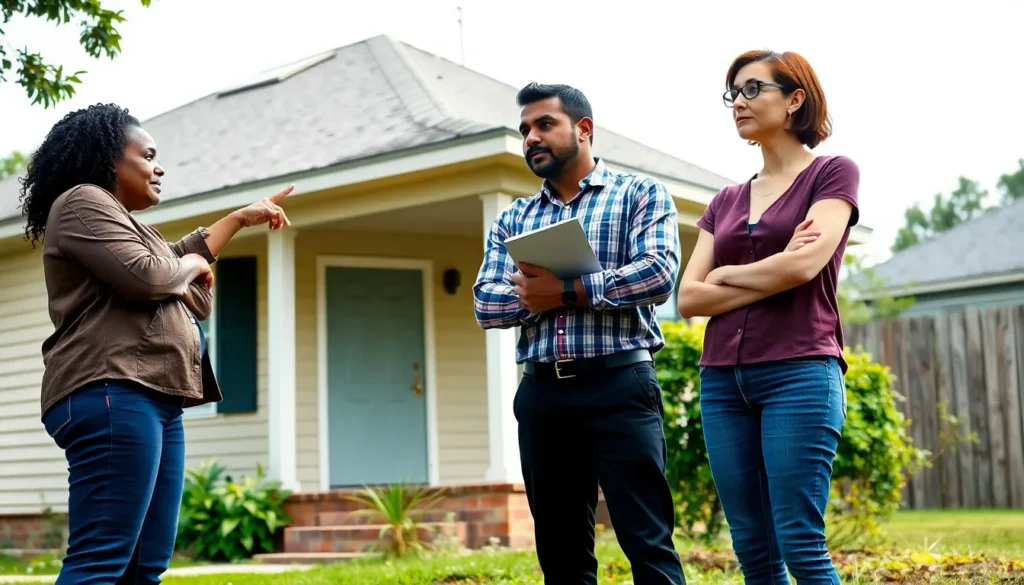Rent disputes can feel like stepping into a gladiator arena where the stakes are high and the armor is made of lease agreements. Whether it’s a disagreement over late fees or a sudden rent hike that feels more like a surprise attack, navigating these situations can be tricky. But fear not—there’s a way to tackle these disputes without losing your cool or your sanity.
Understanding Rent Disputes
Rent disputes arise from disagreements between landlords and tenants. Various factors contribute to these conflicts, creating challenges that both parties must manage.
Common Causes of Rent Disputes
Late fees frequently spark disputes. Tenants may argue the fees are unreasonable, while landlords see them as crucial enforcement tools. Unexpected rent increases lead to conflicts as well. Many tenants expect annual stability, making abrupt changes frustrating. Repairs and maintenance issues often trigger discussions too. Landlords fail to address tenant concerns promptly, resulting in resentment. Additionally, lease violations, such as unauthorized occupants, further complicate relations. Misunderstandings about lease terms contribute to these tensions. Clear communication can typically prevent many of these disputes.
Types of Rent Disputes
Disputes can take various forms in the rental landscape. Non-payment disputes represent significant issues; tenants may claim inability to pay while landlords insist on timely rent. Habitability disputes occur when tenants feel living conditions are unsafe or unhealthy. Rent control disputes often emerge in regulated areas. Conflicts arise when landlords view limits as unfair while tenants view them as necessary protections. Security deposit disputes regularly surface too. Landlords often retain deposits for damages, while tenants expect full refunds. Lastly, eviction disputes represent serious conflicts, with landlords pushing for vacating and tenants asserting their rights. Understanding these types helps both parties navigate their options.
Steps to Handle Rent Disputes
Handling rent disputes requires a systematic approach. Clear strategies can lead to effective resolution.
Documenting the Issue
Start by collecting all relevant information related to the dispute. Include lease agreements, payment records, and correspondence with the landlord or tenant. Photographs or videos supporting claims about property conditions help greatly. Ensure to keep a timeline of events that led to the disagreement. This organized documentation strengthens any case, whether in negotiation or potential legal action. Recognizing the importance of comprehensive records aids both parties in understanding the situation better.
Communicating with the Other Party
Open lines of communication foster constructive dialogue. Approach the other party calmly and respectfully. Use written communication for clarity, ensuring the message includes specific details of the dispute. Listen actively to their perspective and avoid confrontational language. Propose solutions that reflect a willingness to compromise. When both parties feel heard, they can work towards an agreeable resolution that meets their needs. Maintaining professionalism during these discussions enhances the potential for a friendly outcome.
Legal Options for Rent Disputes
Landlords and tenants may face situations that require legal intervention. When all other resolution methods fail, exploring legal options becomes essential.
When to Seek Legal Advice
Contact a legal expert when negotiations stall. Legal advice is critical if threats of eviction surface or if there’s potential for significant financial loss. Engaging an attorney helps understand rights under local rental laws. Legal counsel is beneficial when lease agreements are ambiguous or unclear. Seeking advice early can provide clarity and prevent future complications.
Types of Legal Actions
Several legal actions address different rent disputes. Filing for breach of contract occurs when one party fails to uphold lease terms. Tenants might file complaints with local housing authorities regarding habitability issues. Mediation serves as an alternative, helping both parties reach agreements with the help of a neutral third party. Small claims court offers a venue for resolving disputes over unpaid rent or security deposits. Eviction proceedings can be initiated to address tenant non-compliance, ensuring landlords follow proper legal procedures.
Preventing Future Rent Disputes
Clear communication and a solid lease agreement play crucial roles in preventing future rent disputes. Maintaining a proactive approach can significantly reduce misunderstandings.
Tips for Clear Communication
Establishing open lines of communication fosters trust between landlords and tenants. Listening actively when discussing issues promotes a positive atmosphere. Regular check-ins about rent, maintenance, and concerns help address problems before they escalate. Using straightforward language when explaining lease terms ensures clarity. Documenting discussions can also create a record that supports accountability.
Importance of a Written Lease Agreement
A written lease agreement lays the foundation for a transparent landlord-tenant relationship. Clearly outlining responsibilities and rights helps avoid confusion. It should cover essential details such as rent amount, payment due dates, and late fees to prevent disputes. Incorporating maintenance responsibilities within the agreement provides clarity on obligations. Having both parties sign the document solidifies the agreement and enhances legal enforceability.
Conclusion
Handling rent disputes requires a proactive and organized approach. By documenting relevant information and maintaining open communication, both landlords and tenants can navigate these challenging situations more effectively. Respectful dialogue and a willingness to compromise can lead to satisfactory resolutions.
When conflicts escalate beyond informal discussions, seeking legal advice can provide clarity on rights and options. Establishing clear terms in lease agreements and fostering trust through regular communication can significantly reduce future disputes. Ultimately, a collaborative mindset can transform potential conflicts into opportunities for stronger landlord-tenant relationships.











